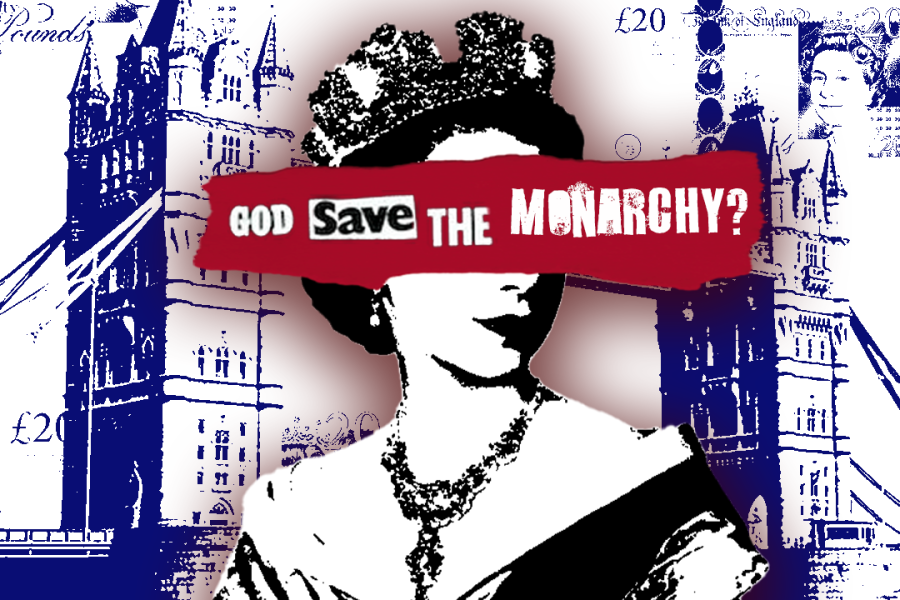God Save the Monarchy?
In the wake of Queen Elizabeth II’s funeral, it’s high time we laid the monarchy to rest
September 28, 2022
Queen Elizabeth II’s funeral was held on Sept. 19, 11 days after her death on Sept. 8, with a full ceremony at Westminster Abbey accompanied by a procession. Britons everywhere seemed to mourn in unison, with flowers hurled at the queen’s hearse and a 14-hour queue just to see the coffin of the late monarch.
On the day of the funeral, a bank holiday was declared, as outlined in Operation London Bridge, a plan enacted in the 1960s which explained the procedures in the event of the queen’s death and the ceremonies that would surround it. This extensive plan, which was enacted flawlessly throughout the country, has resulted in an inopportune exacerbation of the already looming economic crisis that Britain faces.
The British Parliament was suspended for a 10-day mourning period, resulting in a delay on the passing of crucial economic bills (see Liz Truss’s fiscal event), which could help resuscitate an economy that is suffering tremendously. Beside the slight bump in tourism that royal events create, especially one as large and unprecedented as the queen’s funeral, the British economy looks worse for wear after the passing of Her Majesty, once again raising the question that many Britons seem to be asking themselves: Do we still need the British monarchy?
In the wake of such a presumably unifying moment as a beloved monarch dying, there is still controversy around the role of the British monarchy in the world. For many — especially those outside of Britain — the queen’s death is something that calls for celebration rather than mourning.
From a global perspective, Elizabeth was a relic of an era many thought dead. Monarchies, though less powerful now than in the past, are loaded topics in the modern era, especially when one has a bloody past like the British monarchy does.
The permanence of the queen has often been a focal point for British adoration of the monarch. Many in the U.K. have likened her to a “grandmother” or kindly figure of tradition. For many throughout the Commonwealth, however, the queen is a reminder of the crown bearing down upon them. Her perpetuity throughout the years is utterly antithetical to the idea of decolonization, something which has supposedly been in effect throughout British territories for several decades.
While the queen’s reign did not consist of any actual conquering or colonizing, she still held a role in British politics as a spokesperson and oversaw the downfall of the British Empire and dozens of revolutions in the country’s former colonies. The British royal family, albeit stripped of major governing powers, still have considerable wealth and political influence, much of which was extracted from the peoples they oppressed through colonization.
While the queen was relegated to a figurehead role, she still had the choice to be vocal and overturn the legacy of colonization that she inherited. Instead, she left behind the same trail of blood initiated by her forefathers. She is a symbol of a violent and outdated form of governance, and she utterly failed at delivering the bare minimum when it comes to reparations.
The impact of colonization is not confined to a governing body. As an imposition on other humans, colonization has redefined many lives. It has engendered a deeply racist system of beliefs in entire societies. Indigenous cultural practices became diluted through British colonization, which is why many former colonies still partake in customarily British activities such as tea-drinking, cricket and even parliamentary governing systems.
The effect of the monarchy upon the territories impacted by British colonization cannot be understated. The trajectory of entire cultures and countries was irrevocably altered. The descendants of these people are still alive today, and they do not mourn the queen. Instead, many celebrate her passing and hope that this moment will serve to reform, or even abolish, the monarchy as a whole.
From the outside looking in, the economic turmoil furthered by the pomp and circumstance of the queen’s passing only exemplifies the negative connotations of an arguably archaic system of governance that once dominated the world, both literally and metaphorically.
From the outside looking in, the economic turmoil furthered by the pomp and circumstance of the queen’s passing only exemplifies the negative connotations of an arguably archaic system of governance that once dominated the world, both literally and metaphorically. While the country mourns and a historical figure is laid to rest, the questions that define Britain’s future lay more exposed than ever before.
How much veneration do we give to someone with such a complicated and problematic past? When will the atrocities of the past be properly addressed and rectified? How can Britain honor its traditions without utterly destroying British society and economy?
The only way for Britain to adequately address its past is for it to abolish the monarchy and leave behind the archaic system that has oppressed millions around the world.













